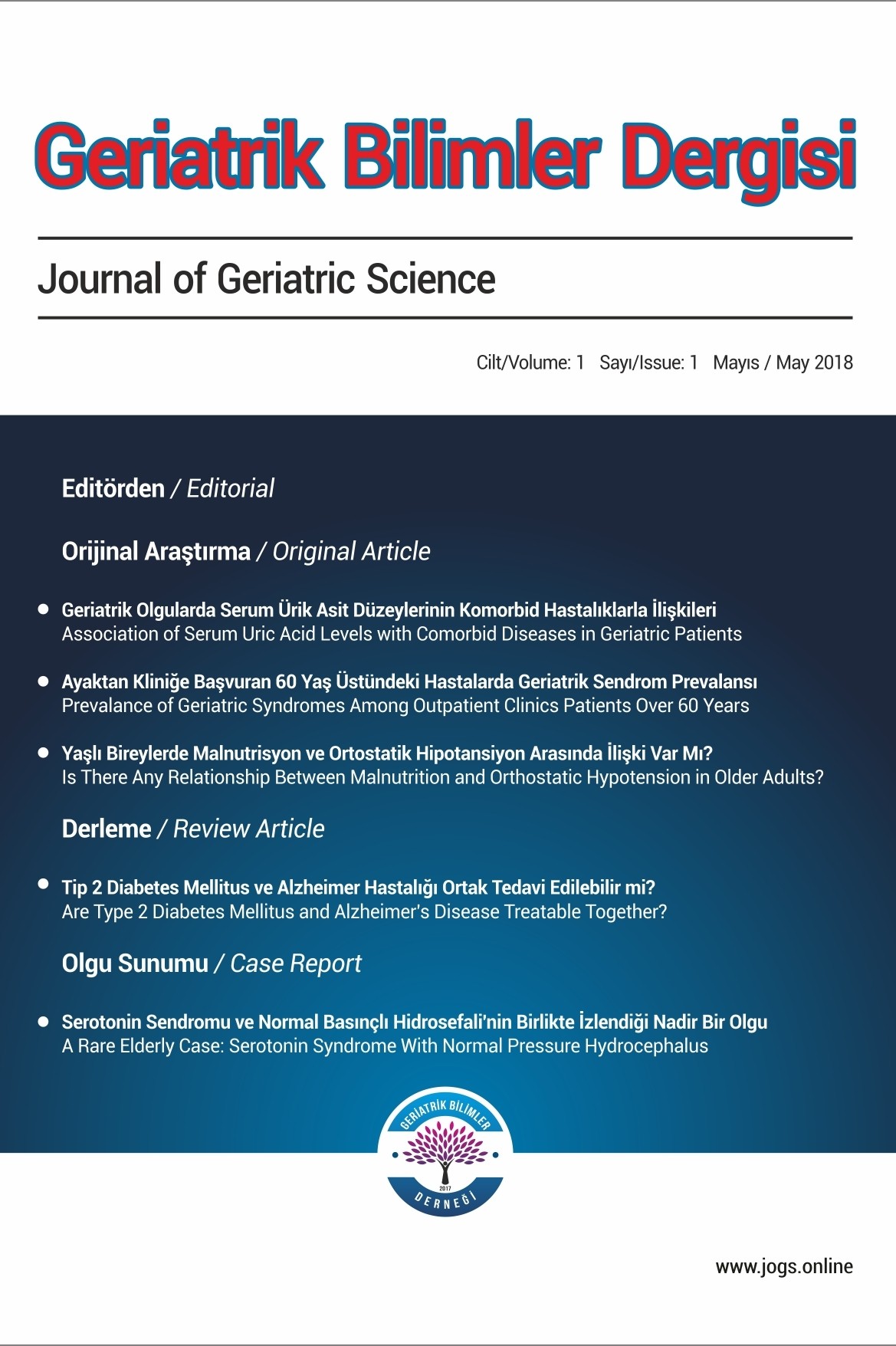Hipomagnezeminin Geriatrik Sendromlar ve Mortalite ile Birlikteliği
geriatrik değerlendirme, magnezyum, mortalite
Association of Hypomagnesemia with Geriatric Syndromes and Mortality
geriatric assessment, magnesium, mortality,
___
- 1. Pham PC, Pham PA, Pham SV, et al. Hypomagnesemia: a clinical perspective. Int J Nephrol Renovasc Dis. 2014; 7:219-30.
- 2. Al Alawi AM, Majoni SW, Falhammar H. Magnesium and Human Health: Perspectives and Research Directions. Int J Endocrinol. 2018; 2018:9041694.
- 3. Cheungpasitporn W, Thongprayoon C, Chewcharat A, et al. Hospital-Acquired Dysmagnesemia and In-Hospital Mortality. Med Sci (Basel). 2020 Sep 1; 8(3).
- 4. Malinowska J, Malecka M, Ciepiela O. Variations in Magnesium Concentration Are Associated with Increased Mortality: Study in an Unselected Population of Hospitalized Patients. Nutrients. 2020 Jun 19; 12(6).
- 5. Pham PC, Pham PM, Pham SV, et al. Hypomagnesemia in patients with type 2 diabetes. Clin J Am Soc Nephrol. 2007 Mar;2 (2):366-73.
- 6. Earl H, Rudolph DO, Joyce MG. Disorders of Magnesium Metabolism Ed: Edgar L, Nissenson A. Nephrology Secrets 3rd ed, Philadelphia, Mosby; 2012, 560-570.
- 7. Association AP. 5th ed. Washington, DC2013. (Diagnostic and Statistical Manual of Mental Disorders).
- 8. Durmaz B, Soysal P, Ellidokuz H, et al. Validity and reliability of geriatric depression scale-15 (short form) in Turkish older adults. North Clin Istanb. 2018 Sep; 5(3):216-220.
- 9. Cruz-Jentoft AJ, Bahat G, Bauer J, et al. Sarcopenia: revised European consensus on definition and diagnosis. Age Ageing. 2019 Jul 1; 48(4):601.
- 10. Unutmaz GD, Soysal P, Tuven B, et al. Costs of medication in older patients: before and after comprehensive geriatric assessment. Clin Interv Aging. 2018; 13:607-613.
- 11. Dutoglu E, Soysal P, Smith L, et al. Nocturia and its clinical implications in older women. Arch Gerontol Geriatr. 2019 Nov - Dec; 85:103917.
- 12. Eby GA, Eby KL. Magnesium for treatment-resistant depression: a review and hypothesis. Med Hypotheses. 2010 Apr; 74(4):649-60.
- Yayın Aralığı: Yılda 3 Sayı
- Başlangıç: 2018
- Yayıncı: Geriatrik Bilimler Derneği
Yaşlı COVID-19 Hastalarında Tedavinin Güçlükleri ve Potansiyel İlaç Etkileşimleri
Esra ATEŞ BULUT, Pinar SOYSAL, Ahmet Turan IŞIK
Geriatrik Erkeklerde Nokturi ve Ayrıntılı Geriatrik Değerlendirme Parametreleri
Pinar SOYSAL, Lee SMITH, Ekrem DUTOGLU, Igor GRABOVAC, Nicola VERONESE, Ahmet Turan IŞIK
COVID-19 Pandemisine Yönelik Gerontolojik Müdahale Önerileri
Sağlık Çalışanlarının Yaşlı İstismarı Konusundaki Algısı ve Farkındalığının Araştırılması
Yaşlılık İnancı ve Yaşlılık İnancını Etkileyen Etmenlerin İncelenmesi
Şenay ÖZTÜRK, Yalçin KANBAY, Meryem FIRAT, Aysun AKÇAM, Burcu DEMİR
Yaşlılarda Depresyon Düşme Sıklığı ile İlişkilendirilebilir mi?
Feyza MUTLAY, Neziha ULUSOYLAR ERKEN, Fatma Sena DOST GÜNAY, Derya KAYA, Ahmet Turan IŞIK
Sosyal Belediyecilik Bağlamında Yaşlı Bakım ve Alzheimer Gündüz Yaşam Merkezleri
Muhammed ŞENER, Hasan Hüseyin TEKİN
İshak ŞAN, Günseli UZUNHASANOĞLU, Birgül ÖZKAN
Hipomagnezeminin Geriatrik Sendromlar ve Mortalite ile Birlikteliği
